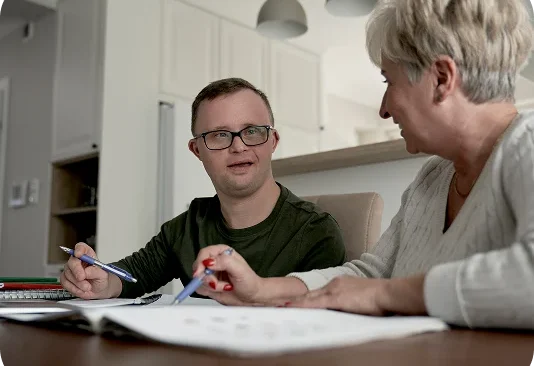CHC33015
Make a real difference in someone’s life.
There are jobs … and then are roles where the reward is helping others live the fullest life possible.
This qualification is sought by providers in disability support and other people-centred organisations, like schools and employment agencies. But the list is expanding and the opportunity to transfer your skills across sectors is booming.
Work either one-to-one or within team environments or community settings, from assisted living quarters to your client’s home.
As this course provides basic knowledge and skills, and is considered an entry level qualification, it is the ideal springboard for graduates wanting to progress to the higher level Certificate IV in Disability.


As attitudes towards disability and approaches to care giving evolve, demand grows for highly skilled people to deliver an increasing range of practical and personal support to a diverse client base.
This qualification targets the skills, knowledge and aptitudes required in community and/or residential care settings. Learn how to work with and support people who may require help due to disability or other reasons, and to follow individualised plans for person-centred support. Hone your interpersonal skills, develop professional judgement and discretion, and learn to identify and take responsibility for your own outputs.
This course will give you a range of factual, technical and procedural knowledge, plus theoretical knowledge relating to the concepts and practices required to provide ongoing person-centred support.
Employment outcomes resulting from the completion of this course may include working with clients who have disabilities in either residential facilities or in the client’s home.
Assessment may consist of
Evidence may be
Note that part of the practical assessment for this course is assessed during the vocational placement. You must successfully pass the vocational placement to achieve an outcome of “competent” for this course.
There are no prerequisites for this course.
Students must be able to obtain an NDIS Working Clearance to be enrolled in this course. A student without the NDIS Working Clearance cannot complete the vocational placement and, therefore, cannot complete the qualification.
All students will engage in a language, literacy and numeracy (LLN) activity to evaluate potential support requirements. Students who are funded are required to complete an alternative and similar activity.
Course consists of 13 units … 7 core units and 6 electives. Assessment activities will include holistic assessment activities as well as 120hr (minimum) vocational placement at which you will demonstrate your learned skills.
| CHCCCS015 | Provide individualised support |
| CHCCCS023 | Support independence and well being |
| CHCCOM005 | Communicate and work in health or community services |
| CHCDIV001 | Work with diverse people |
| CHCLEG001 | Work legally and ethically |
| HLTAAP001 | Recognise healthy body systems |
| HLTWHS002 | Follow safe work practices for direct client care |
| CHCDIS001 | Contribute to ongoing skills development using a strengths-based approach |
| CHCDIS002 | Follow established person-centred behaviour supports |
| CHCDIS003 | Support community participation and social inclusion |
| CHCDIS007 | Facilitate the empowerment of people with disability |
| HLTINF001 | Comply with infection prevention and control policies and procedures |
| CHCCCS011 | Meet personal support needs |
Note that the following does not form part of the course, however they are required for students to be eligible for vocational placement:
Fees vary due to government funding options available for some courses. Please contact us to confirm course fees.
Options may include:
In full time mode, classes are 2 days per week (9:30 – 3:00) and a further day per week to complete assessments – i.e. 3 days per week over 20 contact weeks plus a mandatory 120hr vocational placement.
Course is also offered as a traineeship which is delivered in an on-the-job mode.
Share

